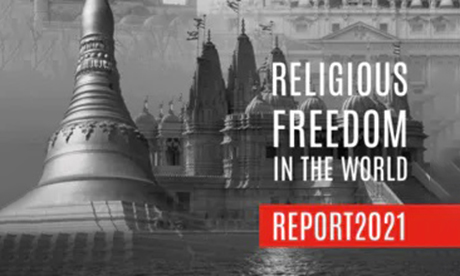Extremists groups are fostering religious hatred by ‘weaponising technology’ according to the recently published Religious Freedom in the World Report 2021 (RFR).
The RFR also says that persecution of faith groups has drastically increased in more than 95 percent of the world’s worst-offending countries.
The report was produced by the international Catholic charity Aid to the Church in Need (ACN).
Over the past two years, it found that oppression against vulnerable faith communities has increased in 25 of the 26 countries listed in the survey’s worst (‘red’) category.
RFR, which covers all 196 countries worldwide, traced the rise of transnational Islamist networks. This includes an online “cyber-caliphate”, which is “expanding globally and is now a tool of online recruitment and radicalisation”.
This core finding of the report describes how “Islamist terrorists employ sophisticated digital technologies to recruit, radicalise and attack”. They have the aim of creating what the report calls “transcontinental caliphates”.
In addition to Islamist extremism, the report identifies principal protagonists of persecution, highlighting increased crackdowns by authoritarian regimes (eg North Korea). It also points to majoritarian religious nationalists’ persecution of minorities in India and Burma (Myanmar).
The Chinese Communist Party is keeping religious groups in line with the help of 626 million AI-enhanced surveillance cameras and smartphone scanners.
Covid-19 was also to blame for increased persecution, according to the RFR. It found that societal prejudice against minorities, including in Turkey and Pakistan, meant that some faith groups were denied food and other vital aid.
In the West, the report says, there has been a rise in “polite persecution”. This phrase was coined by Pope Francis to describe how new cultural norms and values have consigned religions to what the RFR calls “the quiet obscurity of the individual conscience”. This makes it more difficult for people of faith to access the public square.
Regarding positive developments, the RFR highlights progress in inter-religious dialogue. It notes the Vatican’s role, particularly the declaration signed by the Pope and Sunni leader Grand Imam Ahamad Al-Tayyib of Al-Azar.
Reflecting on the gravity of the RFR’s findings, ACN International President Dr Thomas Heine-Geldern stated: “Regrettably, despite the – albeit important – UN initiatives and the staffing of religious freedom ambassadorships, to date, the international community’s response to violence based on religion and religious persecution, in general, can be categorised as too little, too late.”
The report concluded that violations of religious freedom occur in almost one-third of the world’s countries (62 out of 196). Many any of them the most populous nations such as China, India and Pakistan.
